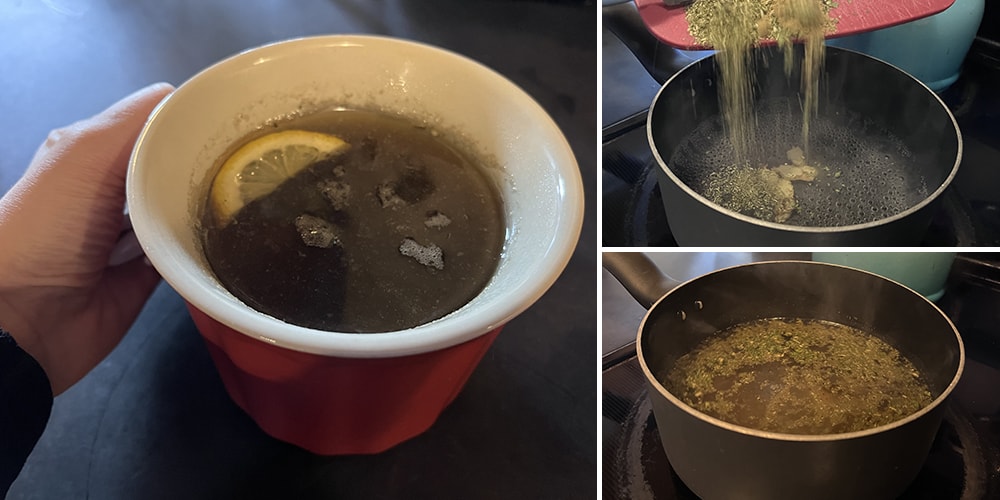
The Herbal Forgotten Potion for Allergies
Spring is in the air, and with the warm weather and fresh buds comes the worst part of the season – allergies.
Allergies can be incredibly frustrating, causing sneezing, itchy eyes, and a constant sense of congestion. Oftentimes, your options are either to tolerate these symptoms or take daily medications that leave you feeling drowsy and drugged.
Fortunately, there are many natural remedies that can help alleviate allergy symptoms without any side effects. Throughout the centuries, people relied on common herbs to relieve their allergy symptoms. No matter what continent you find yourself on, there is always a native herb or two that can be used for seasonal sniffles.
One such remedy is this herbal allergy tea potion made with stinging nettle, horehound, ginger, and honey. These herbs are known for their anti-inflammatory properties and have been used for centuries to treat a variety of ailments, including allergies. Honey makes this potion taste good while soothing some of the uncomfortable symptoms.
In this post, we’ll explore these herbs’ health benefits and provide step-by-step instructions on how to make this amazing tea.
Health Benefits of Stinging Nettle
Stinging nettle, also known as Urtica dioica, is a perennial herb that grows in many parts of the world. You’ve likely come across stinging nettle once or twice, as it makes itself known by causing itchy and irritated bumps on the skin if you brush against its leaves. Hence, its name. However, if taken internally, this herb has tons of health benefits.
Stinging nettle has been used in traditional medicine for centuries to treat a variety of ailments, including joint pain, anemia, eczema, and allergies. Stinging nettle contains compounds that have anti-inflammatory properties, which can help reduce the symptoms of allergies, such as sneezing, runny nose, and itchy eyes. In addition, stinging nettle contains histamine, which may help desensitize the body to allergens over time.
Ingesting stinging nettle during an allergic flare-up can help reduce allergy symptoms, and taking it throughout the year can act as a prophylactic that reduces allergies in the future.
Health Benefits of Horehound
Horehound, also known as Marrubium vulgare, is a member of the mint family and has been used for centuries as a natural remedy for respiratory issues, including allergies. It’s also great for digestive problems and bloating. Horehound contains compounds that have anti-inflammatory properties, which can help reduce inflammation in the respiratory tract and alleviate allergy symptoms. In addition, horehound contains marrubin, which stimulates bronchial secretion and helps reduce mucus production in the respiratory tract.
If your allergies are accompanied by coughing and chest congestion, horehound is a must-have herb for treating those symptoms. It can also be used during cold and flu season to keep your lungs clear and prevent the development of infection and pneumonia.
Health Benefits of Ginger
This favorite kitchen staple has so many uses, we always keep some on hand! Ginger root, also known as Zingiber officinale, is a popular herb with a long history of medicinal use. It has been traditionally used to treat nausea, inflammation, and respiratory ailments.
Recent studies have also shown that ginger may be effective in reducing allergy symptoms. Ginger contains compounds called gingerols and shogaols, which have anti-inflammatory properties. These compounds can help reduce the body’s production of histamine, a chemical released by the immune system in response to allergens, which is what causes allergy symptoms such as sneezing, itching, and congestion.
Ginger may also act as a natural antihistamine, helping to block the effects of histamine in the body. Overall, consuming ginger in food or adding it to your tea can be a useful natural remedy for seasonal allergies.
You can also try Dr. Nicole’s Allergy & Asthma Support Bundle.
How to Make the Forgotten Potion for Allergies
With so many powerful herbs, you can make teas and concoctions to help battle your symptoms. I like using them to make tea with honey and lemon because the hot and tasty mix feels great on my throat and sinuses when I start developing spring allergies. It’s also extremely easy to make. Here are the step-by-step instructions:
Ingredients:
- 1 tablespoon dried stinging nettle leaves
- 1 tablespoon dried horehound leaves
- 0.5 inches of fresh ginger root (sliced)
- 4 cups water
- Raw honey
- Lemon (optional)
Instructions:
- Boil 4 cups of water in a medium-sized pot.
- Once the water has come to a boil, add the ingredients to the pot. If you have a metal tea infuser, you can place the herbs into it and submerge it in the water.

- Reduce the heat and let the herbs steep for 15 minutes.

- After 15 minutes, strain the tea into a teapot or individual cups. If you used a tea infuser, simply remove it and dispose of the herbs.
- Add 1 – 3 teaspoons of honey into each mug and mix it well. The honey really helps add a pleasant flavor to the tea while soothing your throat and reducing inflammation.
- This is optional, but I like to add a slice of lemon to each mug. Lemon also helps soothe the throat and adds a nice pop of flavor.

Enjoy your herbal allergy tea!
If you end up with leftovers, you can keep the tea refrigerated in an airtight glass jar for up to a week. When ready to consume, simply pour it into a pot and reheat it before pouring it into mugs and mixing in the honey.
Tips for Making Herbal Allergy Tea
Here are a few tips to keep in mind when making herbal allergy tea with stinging nettle, horehound, and ginger:
- Use high-quality, organic herbs whenever possible to ensure that you’re getting the most potent and effective herbs.
- It is best to use dried herbs and raw fresh ginger for this tea.
- If you don’t have fresh ginger, dried ginger can be used instead – about 1 – 2 tsp for this recipe.
- Be sure to steep the herbs for at least 15 minutes to allow the compounds to fully infuse into the water.
- This tea can become quite bitter, so using honey to sweeten the flavor is helpful! You can also dilute it with a little bit of plain water if the flavor is too strong.
Other herbs can be added to the tea if desired. For example, goldenrod (Solidago canadensis) and rosemary (Salvia rosmarinus) have some anti-allergy properties as well.
The Bottom Line
If you suffer from allergies, herbal teas may help alleviate your symptoms. This potion is made with herbs that have anti-inflammatory properties and have been used for centuries to treat respiratory issues. You can drink this daily during allergy season and you can safely consume up to 3-4 cups a day. By following these step-by-step instructions and tips for making herbal allergy tea, you can enjoy the benefits of these herbs in a delicious and natural way.

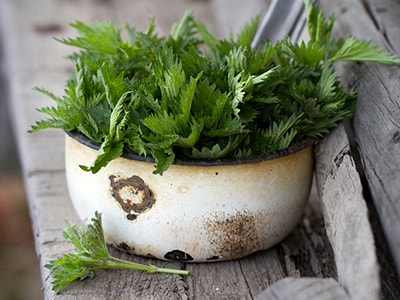
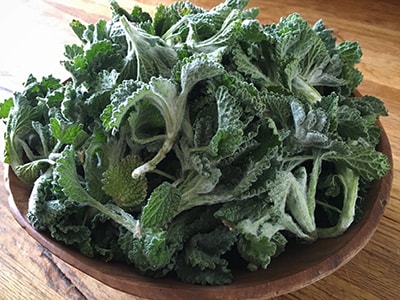
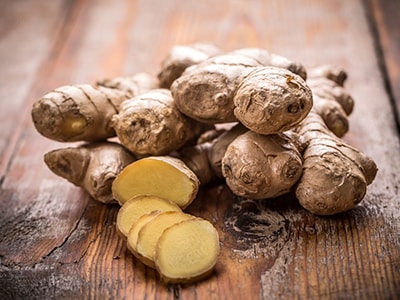
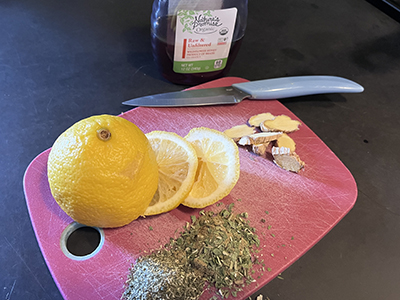
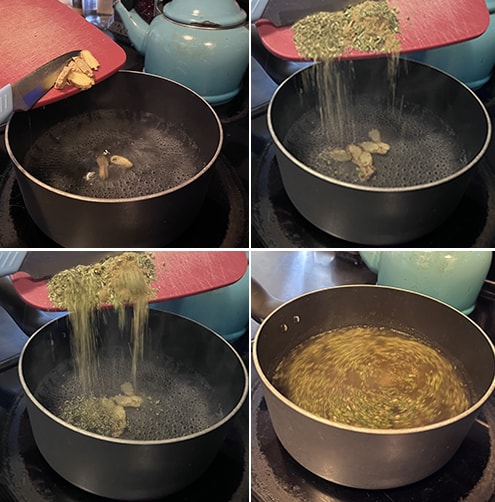
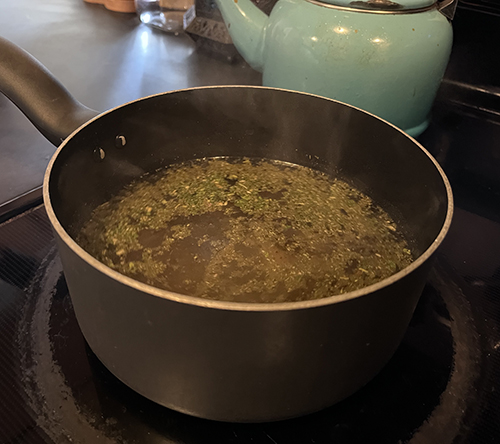
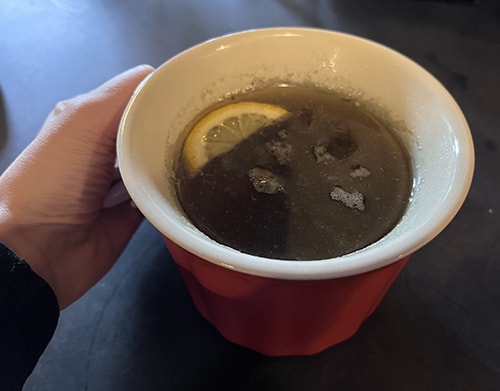

Can Urtica urens be used in place of Urtica dioica? The annual herb is prevalent where we live and much easier to acquire than the perennial. Will it have the same benefits?
Hi Jeanette,
Thank you for your comment!
There is not much research on the use of Urtica urens for allergies.
Nettle leaves boost the entire metabolism and are frequently added to teas to treat liver and gallbladder diseases, rheumatism, gout, and other conditions as well as some detoxification remedies. Both the tea and the roots help men with prostate issues by encouraging urine excretion. In homoeopathy, the entire flowering plant is used to create a remedy for skin rashes that are accompanied by burning and itching. Additionally, it helps to increase urine flow and is used for gout, rheumatism, light burns, and sunburn.
Many blessings and good health!
Thank you for the recipe
Where can I find horhound and stinging nettle
You can buy from a company that sells herbs or buy from a local natural foods shop. Mountain Rose Herbs is a reputable company.
Does this tea have to be taken warm, or can it be served over ice?
Hi Lauri,
Thank you for your interest in our article!
You can serve it both warm and cold.
Many blessings and good health!
I would recommend this warm if your attempting to affect the respiratory tract. Cold on diffusive herbs tends to affect the kidneys and urinary tracts. Also if you want to address seasonal allergies I found find a local honey company to your area and buy bee pollen. Start low doses long before allergy seasons start and slowly ramp up. The reason being the bees from your local area are likely to have picked up pollen you react to in larger doses during allergy season and taking small doses each day helps your body build a tolerance for the pollens which essentially lessen and in some cases even eradicate the allergy response to them.
I also found eye washes or compresses (tea bags) of eyebright good if you get itchy irritated eys from allergies. Using a neti pot can also really help remove any allergens you may have breathed in too.
I never used horehound for allergies before just coughs so interesting recipe thank you.
Do you recommend a store to purchase your herbs?
Mountain Rose Herbs is a good, reliable source if you don’t have any natural food stores in your neighborhood or closest town.